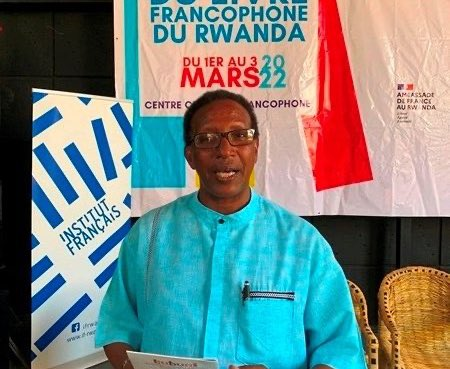
Jean Marie Vianney Rurangwa.
In a joint event, at the Kigali Genocide Memorial Amphitheatre, Rwanda Basic Education Board (REB) together with Aegis Trust today launched the book: “Le Génocide perpétré contre les Tutsi du Rwanda expliqué à ses Enfants” authored by Jean Marie Vianney Rurangwa.
As we mark the 30th commemoration of the Genocide against the Tutsi, it is imperative to reflect on contemporary challenges related to the Genocide. More specifically, REB and Aegis Trust have been collaboratively organizing campaigns against the Genocide ideology in schools, using various formats and this event is an opportunity to explore existing tools and material that will support memory transmission to the young generation.
This book delves into the question on how parents can discuss the history of the Genocide against the Tutsi to their children. It provides innovative and artistic tools to engage both parents and educators in fostering a deeper understanding of this historical event, the Genocide against the Tutsi, and explain it to children.
Freddy Mutanguha, the CEO of Aegis Trust, emphasized the significance of the book: ‘This book serves as a beacon of remembrance, offering a thoughtful and practical guide for parents and educators in the delicate and challenging task of teaching young people the painful yet crucial history of our country. This book launch is an invitation for a call to action for memory transmission and a testament to the power of education in building a more compassionate world.”
Freddy also highlighted the great timeliness of the book launch: “This marks a significant milestone in the ongoing battle against genocide ideology, as we strive to equip the younger generation with the knowledge and understanding needed to build a future free from the shadows of the past.”
Director General of Rwanda Basic Education Board (REB), Dr. Nelson Mbarushimana, noted the value of this book to the education sector: “This book provides valuable insights, resources for our educators to effectively teach history to students. It also contributes to the preservation and dissemination of the history knowledge to our today ‘s generation, and future generation. Our students deserve to know more about our past, more specifically on the 1994 Genocide Against Tutsi. We need more writers in our society who can tell our story as Rwandans. Basic education sector will continue to teach history as lesson in our classrooms, and the topic of 1994 Genocide Against Tutsi will remain the irreplaceable one to our students.” (End)
